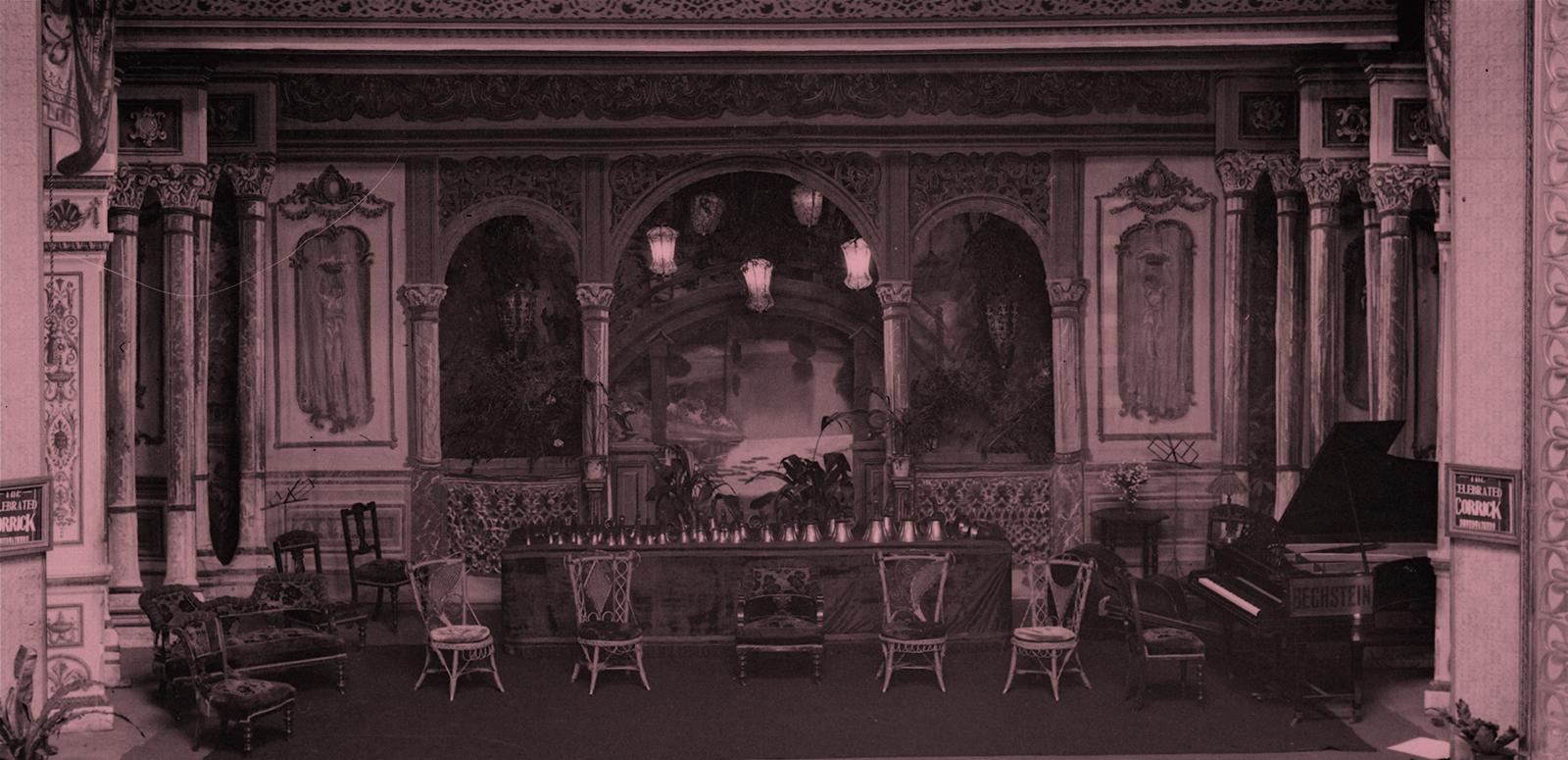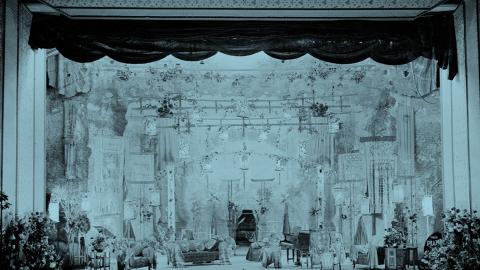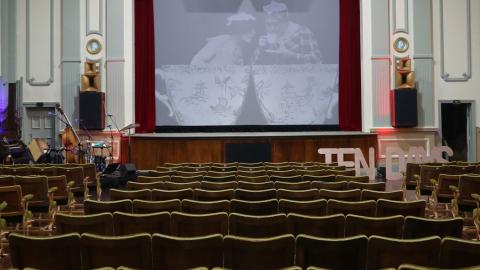

Elsie Corrick
Elsie Corrick interview transcript
This is a transcript from an audio recording of an interview with Elsie Corrick, aged 80, c1974 (NFSA title: 1679719).
Elsie Corrick interview transcript
Speaker 1 (Elsie Corrick):
(Singing)
You thought I was going to say my silhouette is straight to rhyme with great. My silhouette is not straight to rhyme with great. My silhouette is curvy. I would show you but now I've got to start and play a game and play this till I'm ready.
(singing)
[inaudible] grease paint off. I have got a lot of grease paint on my face today. I'll just wipe it on the end of the piano for next time I sing on the air.
(singing)
Well, my dad was a wonderful musician. He came from England and I don't know where he learned all the operas, but he was an organist in all the churches, one after the other in Christchurch, in New Zealand. And he raised this family and he started to teach them all the operas and the instruments. And my sister, Alice Corrick, when she was only 17, he had taught her to sing the fast solos and La Traviata in Italian. And she used to sing at the Philharmonic Society in Auckland and Wellington and Christchurch and Dunedin. And when she came over to Tasmania, she sang in the Hobart Town Hall and Lord and Lady Gormanston were there and they had the vice-regal party and it was all written up. And when she went to Melbourne, The Bulletin was the first sensible paper in the world. I'll say sensible, because they were very sensible to call the Corricks the 'marvellous' Corrick family of musicians.
...
Well I was a little girl about 4 when they first started to travel and I used to be always playing the pianos because he had 4 pianos in his studio in Colombo Street – not in the street, of course, [but] in his studio which was upstairs. And he had all the band instruments and he taught me to play the piano and I was always playing the piano. And he came upstairs one day, because we had our best piano in mother's drawing room upstairs, where all the red plush furniture was, and I was always playing it.
So dad came upstairs, and you know what he had? He had a hammer and some tacks and elastic and a big blanket. And he started hammering under the piano, and you know what he was doing? He was putting a blanket across, because my legs kept kicking his best piano and he thought I might scratch it and ruin it. So my mother said, 'What are you doing?'. So he said, 'Well, I wouldn't dare thwart a little lady that's so fond of playing the piano. I might thus be spoiling a genius.' So I was allowed to play the piano as long as the blanket was up and I didn't keep kicking it.
Then when I went to school in Wellington see, my family started to give concerts and they took Alice and they kept on travelling. And they kept forgetting to stop because, when I was a little girl, I used to play the cathedral square organ in Christchurch because my dad would be playing the organ. And I would tell him he was wanted in the vestry, and it really was a fib, he wasn't wanted in the vestry at all. But I wanted to have a tune on the pedals. You see?
So I'd put 2 feet on the pedal like this, the big bass pedal note, and I'd pull out a stop and it would shiver and shake and it would shake the muscles in my legs. And so my brother was a bit bigger than me. And he said, 'You mustn't do that, pull those big stops out on the organ'. And he said, 'And you mustn't pull out this one because it stirs rain on the stop'.
Well, the stop is a sort of a plug that you pull out on the organ. And in those days, people used to like to be entertained by having the organ play the storm. You see? So this plug made the organ go just as though it was raining. And so my brother said to me, 'Little Elsie, you must not pull that one out because it'll make it rain. And then all the frogs will come out from under the church.' So I was afraid to touch that. And I used to think, 'Well, I wish I could pull it out just a little bit to see if one frog would come out or if a tadpole would come out'. But I never had the courage to pull it out.
Speaker 2: (Interviewer):
We'll come back in a minute.
Elsie:
The Corrick family used to have a big stack of stuff because they used to travel with a cinematograph. And they were the very first to show moving pictures in Australia. They'd had a huge show up with all the talent of the family and all these pictures that had never been seen in lots of towns where they showed them. So he had the privileges like that in England. And when he came back to Australia, they used to play in the town hall in Adelaide for a month and in the Queen's Hall for a month.
And so they had all this gear, but they couldn't travel every day on the trains. So when they asked for concessions on the Australian trains, they said, 'We can't give you concessions unless you're travelling every day on the train'. So my dad said, 'Well, when you're giving a season of a month concerts in the cities, you wouldn't be travelling every day'. So the result was that he got so annoyed that he went into, I think the firm was called Holden's in those days in Adelaide, and they had their windows all full of Tin Lizzies and my dad was looking at them all and asking questions. And they also had one that was like a van.
And he said, 'I'd like to buy 4 Ford cars'. And the man nearly sat down backwards on the seat. He said, 'Four Ford cars? What are you going to do with them?'. So he said, 'Well, we're touring Australia. Instead of using the railways, we are going to use the Ford Tin Lizzies because the Australians won't give us any concessions unless we use the trains every day.'
And in London they promised us all sorts of privileges, like a van in St Pancras Station to go to any hour of the night. And here in Australia, there's such a lot [inaudible] all the things. I don't think he really said that, but I'll say it, and he was so disgusted that he said he was going to use Tin Lizzies. So off he set. So if you don't know your geography, you might not realise that there's a 90-mile desert between Adelaide and Melbourne. And the result was that we had to put the Tin Lizzies on the trains.
So after that, we started to travel and give concerts. So by this time my dad had had a heart attack with all this worry, I suppose, of the big family and railway companies and one thing and another. And so we were going to do another tour of Australia. So after we gave a concert at Balranald, my brother said, 'Now we'll do the first 20 miles after the concert tonight'. So we packed up and off we went.
Well, in those days, the properties were owned by private landowners and they had gates you had to open to go through. And when you got to the gates, there was a terrific lot of sand and loose soil. So I was one of the drivers and I was the chief cranker because you had to be a self-starter to start the cars. You had to turn them with a handle and, because I was a violinist that didn't want to break my wrist, I was told not to put my thumb around the cranking handle. And I used to be the chief starter. So the result was we'd unlock and get in these gates to go on the different properties. And then you'd rev up on your low gear and you'd go whizz bang through the sand and you'd turn around the way you were coming.
So we had 4 cars to do this. So Son [Leonard] and Jimmy Calwell, he was the baritone in the company then, they'd have all sorts of broken things and they'd have to set up. And Son used to travel with spare parts, not for himself, but for the cars. So we were out all night with these 4 cars. We'd have 3 of the 4 bogged in the sand. So then the edge of the Murray River was just like the edge of a dining table without a white cloth on; you could have gone in the dark, straight off the grass into the Murray River, but we didn't. So then we've got to a tiny little town and we decided we were all falling asleep. We'd have to stop, a tiny little place called [inaudible] I think it was. So we put all our toes together in the middle of the drawing room and we had pillows around and we all had a good sleep.
So then when we got to Mildura, in order to cross the Murray, there was a moat. Ruby was a marvellous mechanic. She could change the tremblers and the batteries and she could do spark plugs and we could all take off spare wheels and put on a new tyre and all sorts of things. So when we got to the side of the river, the man minding the moat said, 'Young lady, are you going to drive this car across the river?'. And they said, 'Yes'. He said, 'How old are you?'. And she said [she was] in her teens. So he said, 'I think we'll close the other end of the moat' – so that the cars went down the side of the river and onto the moat, and none of the Corrick family went into the Murray. So the next day we read in the paper, a day or 2 afterwards, that a big strong man had driven a car onto the moat and he hadn't put his brake on soon enough and he'd gone into the Murray.
...
Well, when we were coming back from Mildura – this is not musical, but it's very interesting to all the motorists in the town. When we were coming back from Mildura, we had 4 cars and there was a manager of a bank. And he wanted to take a young lady with him on the same trip. So he asked if he could join up with us. So we said, 'Yes'. So we set out and the temperature was 111 in Mildura when we left. So we had white dresses on and bare feet and off we set. Well, we no sooner started on the journey from Mildura when one of those big thundering rainstorms started and it was terrific.
So the result was that all the soil turned to mud. So the result was that we had to get out and we took our white shoes and stockings off and walked in the mud. And we had to use our fists to get the mud away from between the wheels and the car. So we tried to use paper and we ran out of paper. So we were literally pulling the mud away from the wheels and then we'd have to crank and crank and get the cars going.
So we had 4 out of the 5 cars bogged at one time, once. And so then in the midst of helping them all, I looked down and there was a centipede as long as you could stretch from your thumb to the top of your finger. And so I yelled and screamed. So we all put our muddy shoes on again after that. But we finally got to the end of the journey safely.
(singing)
Elsie:
Thank you very much.
Main image: Interior of town hall, Geraldton, WA, 1910. NFSA title: 1114350.
The National Film and Sound Archive of Australia acknowledges Australia’s Aboriginal and Torres Strait Islander peoples as the Traditional Custodians of the land on which we work and live and gives respect to their Elders both past and present.


